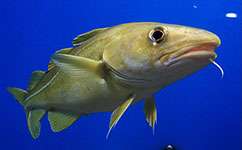Changing climate may leave some species homeless

As oceans warm some species may be forced to find new habitats or face extinction, scientists say.
A new report, published in Nature, looked at how quickly temperatures are changing and how this will affect habitats and the species living there. The research aims to highlight vulnerable areas and help focus conservation efforts.
Animals and plants can often only survive in a very strict temperature range, so as climate change causes their habitats' temperature to change these species have to move and adapt.
'When, in a particular location, temperatures exceed the upper limit for a certain species, that species can no longer live there. Likewise, when temperatures in another place become warmer than a species' lower limit, that place can become newly habitable. This analyses shows where you'd expect to see species relocations,' says Professor Mike Burrows of the Scottish Association for Marine Science (SAMS), who led the research.
To find out how far, and in what direction species would have to shift in order to survive, the team used sea-surface temperature data to build a map of temperature contours over the oceans. They then shifted the contour lines to show how the ocean temperatures might change over time.
The team were particularly interested in how land masses can create barriers that might prevent a species from migrating to a more suitable climate.
'If there is a land mass blocking potential temperature shifts in the ocean then it might stop species from warmer environments being able to shift to cooler ones. The southern Mediterranean is a good example as you would expect species who were tracking the climate to migrate into areas of sea near the African continent, yet the African landmass makes this cooler place inaccessible,' explains Burrows.
If species that are unable to reach a more suitable habitat cannot adapt quickly enough to cope in the new temperatures, they may become extinct.
'So for cold-water animals in the North Sea, like cod, as the North Sea warms they'll retreat northwards but because there's not much of an entrance to the North Sea it might be difficult for warmer water species to replace them,' Burrows says.
'In most places there will be a balance between those animals that move out and those that move in. Nowhere will be completely bereft of animals and plants in the near future, but in some places there may be a decline in the number of species,' Burrows concludes.
Journal information: Nature
Provided by PlanetEarth Online
This story is republished courtesy of Planet Earth online, a free, companion website to the award-winning magazine Planet Earth published and funded by the Natural Environment Research Council (NERC).



















